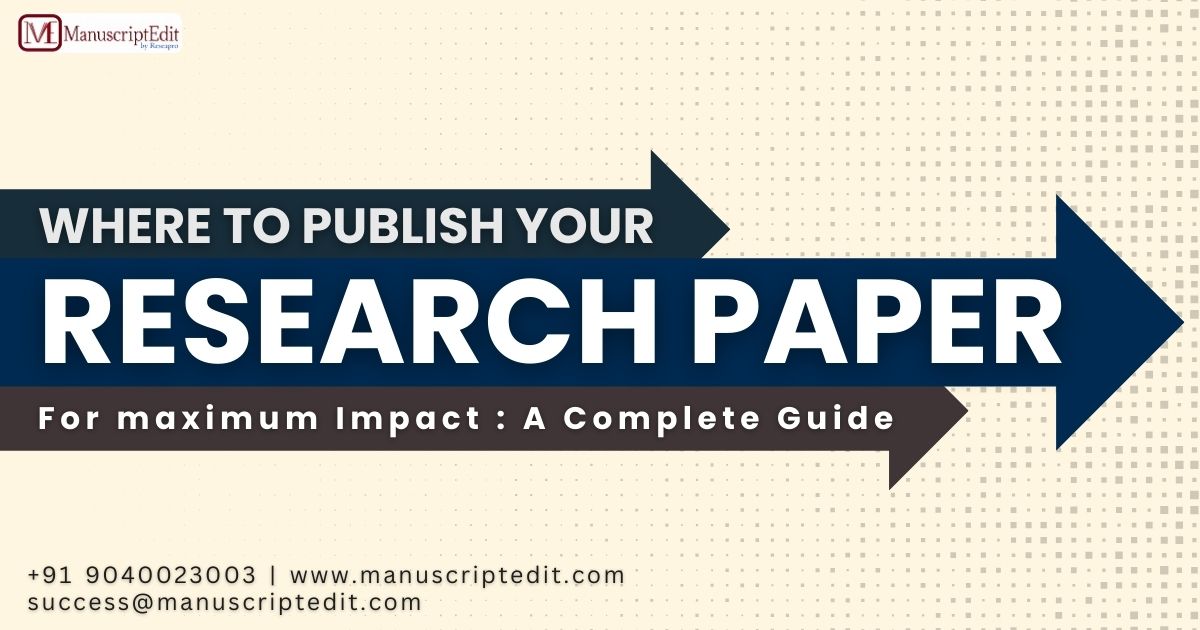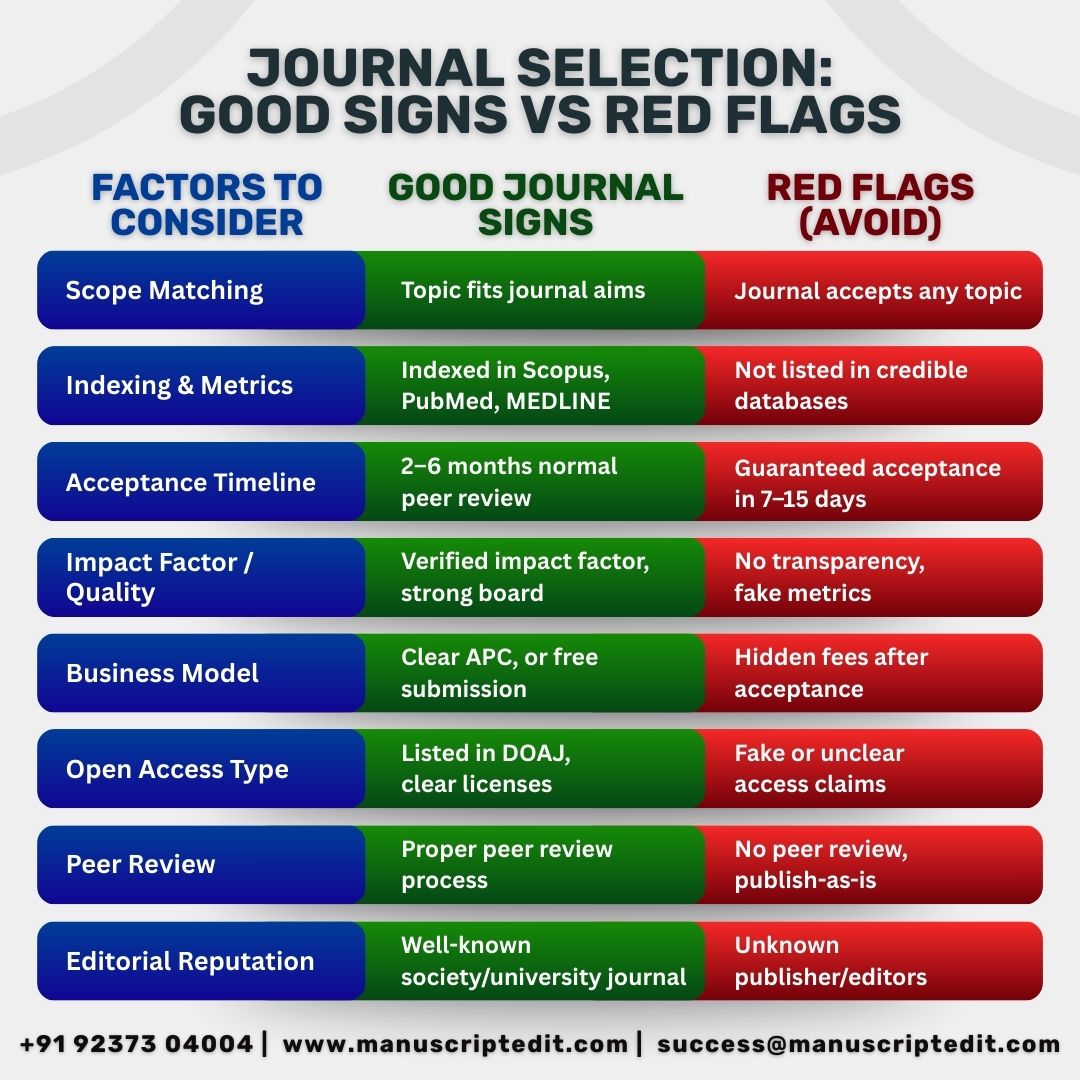|
Getting your Trinity Audio player ready...
|

Selecting the appropriate journal to get your research paper published may seem tough. With numerous journals published in multiple fields, selection can make you wonder where to start. This blog seeks to demystify that choice, giving you an inside look at the most important criteria for making your research go far. ManuscriptEdit’s Publication Services will guide you through this process with professional assistance.
Table of Contents
Why Journal Selection is Important?
The journal you choose to publish your research in can really influence the exposure and effect of your research. Below are some reasons why having the appropriate journal is crucial:
- Academic Credibility
Publishing in a well-known journal adds weight to your research. Well-known journals tend to draw better-quality peer reviews, so your work is thoroughly critiqued and accepted by leading experts in the field.
- Quick Publication Timeline
Some journals have a quicker review and publication process, allowing you to publish your findings sooner. This can be essential, particularly in rapidly advancing fields where timely
information can inform future research.
- Increased Audience Reach
A reputable journal can make your paper more visible, reaching a wider audience. This visibility can translate into more citations, extending your research’s impact and helping your academic career.
- Career Benefits
Publishing in high-level journals can dramatically increase your academic and professional reputation. It can create opportunities for collaborations, grants, and educational or industrial job opportunities.
Essential Considerations Before Selecting a Journal
Before choosing where to publish, there are some essential factors to consider to maximize the chances that the journal will be the optimal outlet for your research.
Align Your Research Topic with the Scope of the Journal
One of the most critical steps is to align your research topic with the journal’s scope. Journals tend to specialize in some areas, and submitting your research to a journal with a similar subject will improve your chances of acceptance.
Check Journal Indexing and Ranking
Journal ranking and indexing represent a publication’s quality and visibility. Ensure the journal is indexed in well-known databases such as Scopus, PubMed, or Web of Science. A journal with a higher ranking usually has a broader audience and greater impact.
Know the Journal’s Acceptance Rate and Review Time
Knowing the acceptance rate for a journal will assist you in understanding how competitive submitting is. Equally, being aware of the average review time will assist you in planning your publication timeline accordingly.
Open Access vs. Subscription Journals
Open-access journals provide your paper for free to a larger audience, which can result in more exposure. But they can charge more fees. On the other hand, subscription-based journals tend to have lower costs but can have a more limited audience. Balance these options carefully, depending on your needs.
Ethical Publishing: Avoid Predatory Journals
It’s essential to be aware of predatory journals that practice unethical behavior, like charging fees without providing real editorial services. Steer clear of these journals at all costs, as they can ruin your reputation and waste your time and money.
Common Errors Researchers Make When Choosing a Journal
Selecting the wrong journal can have serious repercussions for your paper’s success. Here are a few common errors to avoid:
Selection based on Impact Factor Only
Though the impact factor is effective, it should never be the basis for decision-making alone. The high impact factor is not always reflected in the most suitable journal to publish your work, particularly when its theme isn’t suited for your job.
Overlooking Journal Guidelines
Every journal has submission guidelines. These should not be ignored, or your manuscript might be rejected. Always ensure that your manuscript is in the format and follows the journal’s submission requirements.
Submission to ‘Easy Acceptance’ Journals with Limited Credibility
Some scientists might be tempted to submit their work to those journals with easier acceptance rates for faster publication. However, these journals might be less credible or visible than higher-competition, high-quality journals.
How ManuscriptEdit Can Assist You in Publishing in the Proper Journal?
Selecting and submitting to the appropriate journal need not be challenging. ManuscriptEdit provides complete publication services to assist you in navigating each step of the process:
- Expert Journal Recommendation Service
Our experts will assist you in determining the most appropriate journals for your work. We consider your subject, objectives, and the journal’s scope to ensure your paper is submitted to the most relevant publication.
- Manuscript Editing and Formatting Support
Our staff is skilled at editing and formatting your manuscript to suit the specific needs of your target journal, thereby increasing its chances of acceptance and limiting the time involved in revisions.
- Full Submission Handling Assistance
We provide complete assistance with the submission process, from manuscript preparation for submission to dealing with all correspondence with the journal. This allows you to concentrate on your research while we handle the details.

FAQs
- How do I select the most appropriate journal for my research paper?
Consider the journal’s scope, impact factor, indexing, and acceptance rate. Check if the journal is compatible with your research field and objectives.
- Should I favor open-access or subscription journals?
Open-access journals provide broader visibility but can involve higher fees. Subscription journals are limited in readership but generally have lower fees. Select based on your exposure aspirations and budget.
- What if I submit to the wrong journal?
Submitting to the wrong journal can result in rejection and wasted time. It’s important to align your paper with the journal’s scope and audience.
- How do I avoid predatory journals?
Avoid journals with unclear editorial processes, excessive fees, and low transparency. Use reputable, indexed journals to ensure ethical publishing.
Conclusion
Choosing the correct journal for your research paper is a vital decision affecting your work’s visibility, credibility, and overall success. By meticulously evaluating factors such as journal scope, indexing, and ethical standards, you can help your research reach the correct audience and have the maximum effect.
At ManuscriptEdit, we offer expert assistance to help you navigate the intricate world of academic publishing. Whether you require assistance with journal selection, editing your manuscript, or submission support, we are here to assist.



